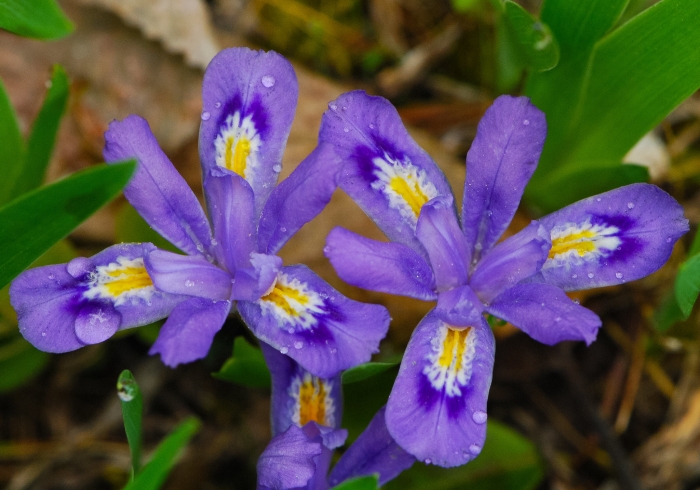Dwarf Lake Iris
(Iris lacustris)
Dwarf Lake Iris (Iris lacustris)
/
/

Joshua Mayer
CC BY-SA 2.0
Image By:
Joshua Mayer
Recorded By:
Copyright:
CC BY-SA 2.0
Copyright Notice:
Photo by: Joshua Mayer | License Type: CC BY-SA 2.0 | License URL: https://creativecommons.org/licenses/by/2.0/ | Uploader: wackybadger | Publisher: Flickr |






































Estimated Native Range
Summary
Iris lacustris, commonly known as Dwarf Lake Iris, is an evergreen perennial herb native to the shorelines and dune areas around the Great Lakes, particularly in Michigan and Wisconsin. This diminutive iris typically grows to a height of 0.2-0.4 feet (0.06-0.1 meters) and a width of 0.2-0.3 feet (0.06-0.09 meters). It forms low clumps of narrow, blade-like leaves and in late spring to early summer, it produces small yet showy flowers that are blue, purple, and yellow, which are highly attractive to pollinators. The flowers give way to roundly triangular or ovoid seed capsules, which are covered by the spathes post-bloom, usually from late June to late July.
Dwarf Lake Iris is valued for its compact size and vibrant flowers, making it suitable for rock gardens, border fronts, and container gardening. It is also used in conservation plantings to preserve native flora. While it is adaptable to a range of soils, it thrives best in moist, slightly acidic to neutral soils. In cultivation, it prefers part shade but can tolerate full sun if kept moist. It is important to ensure good drainage when planting in containers. Despite its beauty, it is relatively low-maintenance, requiring minimal care once established. However, it can be susceptible to iris borer and root rot if conditions are too wet.CC BY-SA 4.0
Dwarf Lake Iris is valued for its compact size and vibrant flowers, making it suitable for rock gardens, border fronts, and container gardening. It is also used in conservation plantings to preserve native flora. While it is adaptable to a range of soils, it thrives best in moist, slightly acidic to neutral soils. In cultivation, it prefers part shade but can tolerate full sun if kept moist. It is important to ensure good drainage when planting in containers. Despite its beauty, it is relatively low-maintenance, requiring minimal care once established. However, it can be susceptible to iris borer and root rot if conditions are too wet.CC BY-SA 4.0
Plant Description
- Plant Type: Herb
- Height: 0.2-0.4 feet
- Width: 0.2-0.3 feet
- Growth Rate: Moderate
- Flower Color: Blue, Purple
- Flowering Season: Summer
- Leaf Retention: Evergreen
Growth Requirements
- Sun: Part Shade
- Water: Medium
- Drainage: Fast
Common Uses
Bee Garden, Bird Garden, Butterfly Garden, Deer Resistant, Hummingbird Garden, Low Maintenance, Rabbit Resistant, Showy Flowers
Natural Habitat
Native to shorelines and dune areas around the Great Lakes
Other Names
Common Names: Iris Lacustre
Scientific Names: , Iris lacustris, Iris lacustris f. albiflora, Evansia lacustris, Iris cristata subsp. lacustris, Iris cristata var. lacustris, Lophiris lacustris,
GBIF Accepted Name: Iris lacustris Nutt.